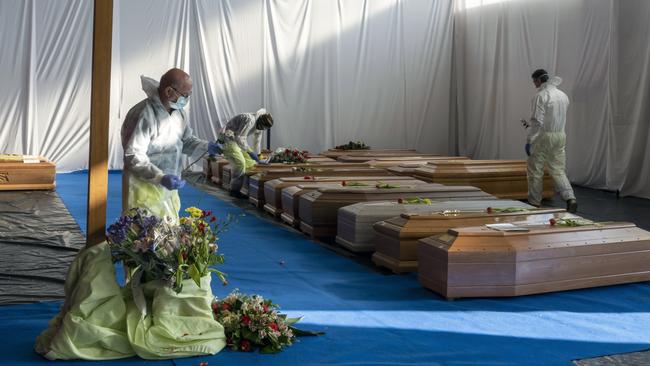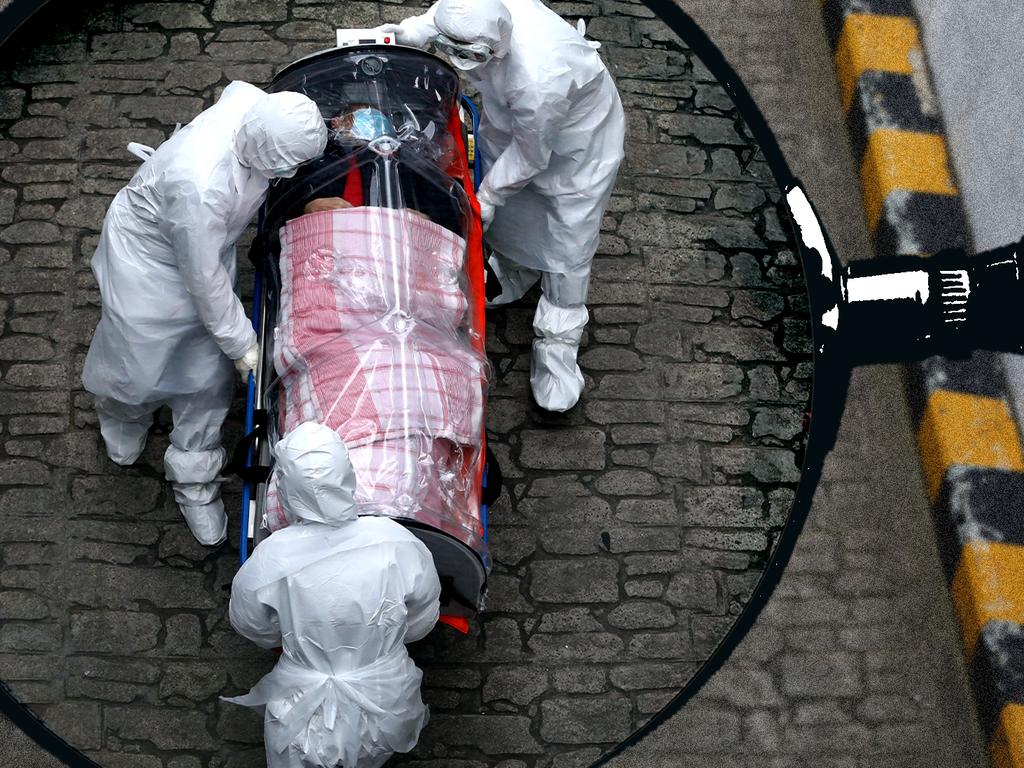Neanderthal Genes Are Linked to Severe Covid Risk
A study in Italy’s worst pandemic hotspot could help explain why some people developed life-threatening forms of the disease while others didn’t.

The northern Italian city of Bergamo suffered one of the world’s highest Covid-19 death rates, with army trucks deployed to carry the dead out of the overwhelmed town in the early days of the pandemic.
A new study carried out in Bergamo now suggests that genes inherited from Neanderthals, extinct cousins of modern humans, could help explain why some people developed life-threatening forms of the disease while others didn’t.
The high number of infections in Bergamo provided scientists with data for the study, though the research doesn’t address why so many people died there compared with other parts of Italy or Europe.
Early on in the pandemic, it became clear that many risk factors were at play, first among them advanced age. Scientists also suspected that genes could leave some people more vulnerable to severe Covid than others. Family members often developed a similar form of the disease, suggesting a degree of genetic predisposition.
Scientists at the Mario Negri Institute for Pharmacological Research in Milan spent the past few years analysing possible links between DNA variations and Covid-19. Their study, published in the journal iScience and based on a sample of nearly 10,000 people in the Bergamo area, identified several genes associated with the development of severe respiratory illness. Three of those genes belonged to a group of variations in DNA, or haplotype, inherited from Neanderthals.
The Italian study found that people who carried the Neanderthal haplotype were twice as likely to develop severe pneumonia from a Covid infection than those who didn’t, and three times as likely to be hospitalised in intensive-care units and put on ventilators.
Unknown is whether the haplotype is more common in the Bergamo region than in other Italian or European regions. Epidemiologists still don’t know why parts of northern Italy suffered such high death tolls, especially early in the pandemic. Scientists have suggested factors could have included age, air pollution and that the virus hit the region early in the pandemic and spread undetected.
“This study shows there is a particular section of the human genome that is significantly associated with the risk of getting Covid-19 and of developing a severe form of it,” says Giuseppe Remuzzi, an infectious-disease expert and director of the Mario Negri Institute, who oversaw the research. “That section is more important than any others to explain why some fall seriously ill.” In Bergamo, 33 per cent of those who developed life-threatening forms of Covid had the Neanderthal haplotype, Remuzzi said. The haplotype was less present in people who developed mild or no symptoms from a Covid infection.
About 2% of the genomes of people of European or Asian origin is inherited from Neanderthals, and has been linked to modern humans’ susceptibility to a variety of diseases.
The Italian research adds to a growing body of evidence suggesting that a cluster of Neanderthal genes increases the likelihood of developing severe forms of Covid-19.
A study published in the journal Nature in September 2020 first suggested that a genomic segment associated with more severe Covid-19 derived from Neanderthals, which interbred at various points with Homo sapiens before going extinct about 40,000 years ago.
The Nature study, co-written by Swedish scientist Svante Paabo, a winner of the Nobel Prize in Physiology or Medicine, found that the Neanderthal genomic segment is carried by around 16 per cent of Europeans and 50 per cent of people in South Asia, parts of which also had high death tolls from Covid.

The Neanderthal haplotype is almost completely absent from Africa. That fact, along with factors such as a young population, could help explain why deaths and severe forms of the disease appeared to be less common in much of Africa than in some other world regions with better healthcare systems, scientists say.
Genetics matters in other ways. Another study, published in Nature in July, showed that a DNA variation that affects the immune system can increase a person’s odds of avoiding Covid-19 symptoms altogether.
“There are just so many factors,” says Marco Cattaneo, the editor of the Italian edition of Scientific American. In the Bergamo region, “measures to stop the virus from spreading is what would have made the real difference.” Bergamo was an early epicentre of the pandemic. Why the disease killed so many people so quickly in the area has lingered as a medical mystery. The coronavirus spread undetected for a long time before it was first confirmed in Italy in February 2020. The Mario Negri Institute found that 11 individuals included in its study reported Covid-like symptoms in late 2019. The first lockdown in Bergamo and surrounding areas took place in early March, by which time the virus had reached countless homes, hospitals and old people’s homes. Italy has one of the oldest populations in the world.
The Wall Street Journal







To join the conversation, please log in. Don't have an account? Register
Join the conversation, you are commenting as Logout